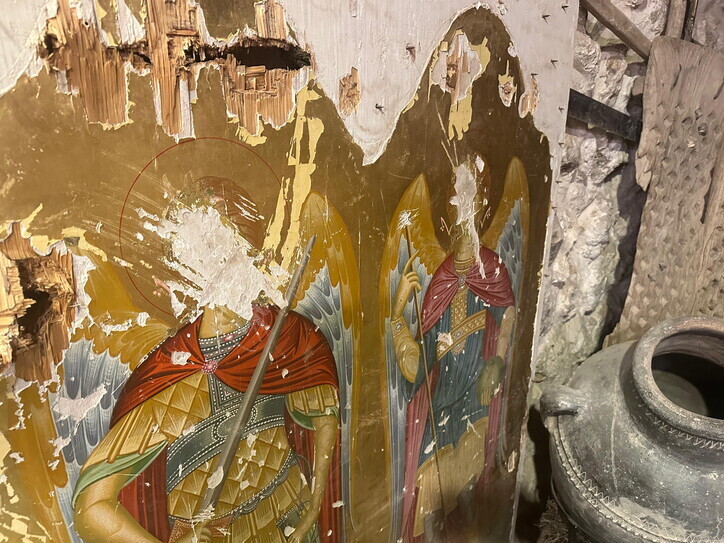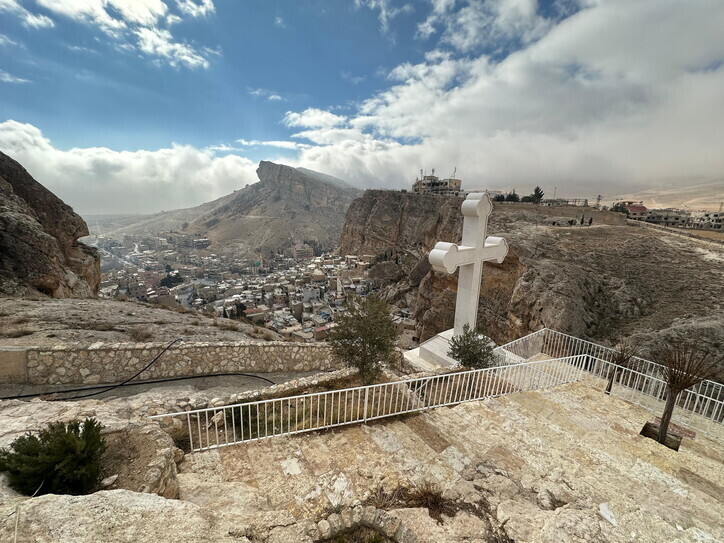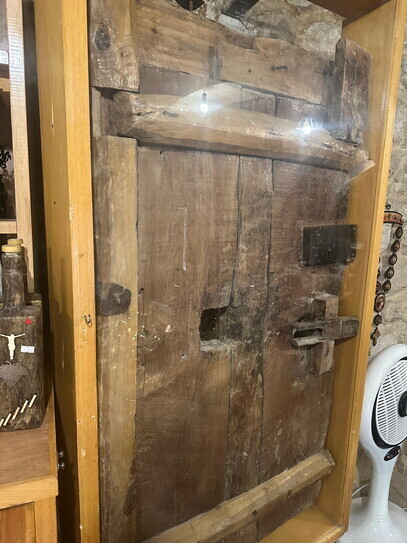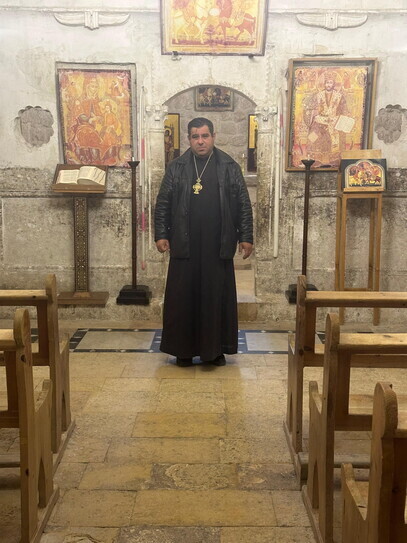
The statue of the Virgin Mary overlooking the ancient Christian town of Maaloula (photo by Luca Gambardella)
"We already know the extremists of Hts". In the cradle of Christianity in Syria, where the looters return
The small Christian village of Maaloula recalls what Julani's group was when they were still called Al Nusra. Here, in 2013, the Qaeda-affiliated militants killed dozens of people and kidnapped twelve nuns. The Syrian government amidst prayers in Aramaic
This article is translated by artificial intelligence. If you want to report errors you can write to [email protected]
Maaloula, from our correspondent. For its inhabitants, the small village of Maaloula represents the original sin of Hayat Tahrir al Sham (Hts). In 2013, about 60 kilometers north of Damascus, the al-Nusra Front—a precursor to Hts—killed dozens of people, kidnapped twelve nuns from the Saint Thecla convent, looted sacred sites, and seized control of the town. In addition to being a symbol of Christianity in the Middle East, Maaloula holds strategic significance, located in the Qalamoun region just a few kilometers from the Lebanese border.
Regime forces and Hezbollah besieged the town between September and October 2013 to prevent al-Nusra extremists from dangerously approaching Lebanon. Following a fierce battle with artillery fire that left lasting scars on the town, the regime and Hezbollah succeeded in driving out the Islamic extremists.
However, the price Maaloula was forced to pay was steep. Of its 15,000 residents, only about 1,000 remain today. "Everyone fled as soon as al-Nusra arrived," says Ghassan, the guardian of the convent. "We lived in terror and do not want to relive those moments." For those who stayed, perched nearly 2,000 meters above sea level with the Bekaa Valley stretching just a few kilometers away, Hts stirs ancient fears.
"We are afraid for our safety and do not feel secure," says Adeel, around 60 years old, his head wrapped in a red-and-white hatta (a type of keffiyeh). He runs a small kiosk that once served snacks and drinks to tourists visiting this cradle of Christianity in Syria. It is thanks to foreign visitors that Adeel learned a few words of English. "This is the first time I’ve used it again, after 13 years," he says with a smile. Villages like Maaloula, which despite their small size had become symbols of an entire country before 2011, are now ghost towns, abandoned and desolate.
Here, however, people take pride in their uniqueness and the millennia-old melody of Aramaic. Maaloula is the only place in the world, alongside two neighboring villages, Bakh’a and Jubb’adin, where the language of Jesus Christ is still spoken. In the small chapel of the Convent of Saint Thecla, Ghassan recites a prayer in Aramaic, enunciating each word carefully.
Before the war, this tiny village attracted dozens of visitors from around the globe eager to study Aramaic. While it was already a language in need of preservation, today it seems inevitably headed for extinction. "The younger generations, my grandchildren, do not study or speak it," Adeel explains. Yet for them—for the elders—prayers in Aramaic remain the sacred link between the origins of their faith and the present, which is once again fraught with uncertainty.
Legend has it that young Thecla, a Christian from a noble pagan family, fled from her father, who had tried to force her into marriage. Upon reaching the mountains of Qalamoun that blocked her escape, she stopped to pray, and miraculously, the mountains opened before her, allowing her to find refuge in a cave where she spent the rest of her life.
In the convent, built in the 18th century around Saint Thecla's ancient cave, only nine nuns remain. Their eyes reflect fear, and they keep their gaze low. "They are afraid the same events from ten years ago might happen again," says the caretaker. In 2013, eleven sisters and the Mother Superior were kidnapped by al Nusra and released three months later in a prisoner exchange with the regime. It was the first horrific act by the Islamists against Christians in Syria. "Al Nusra came here and destroyed everything; we still keep the broken icons," recounts Ghassan. "Others, over a thousand years old, were stolen."

Now, however, Ahmad Sharaa, the leader of Hts and the provisional government that ousted the regime, claims to want to protect minorities, including Christians. “Yes, but the point is that we already know them. Many of those who came to Maaloula under the banners of al Nusra ten years ago, who destroyed homes and killed residents, have returned since the regime fell.”
Asking the Hts members to expel extremists who were part of the current provisional government until recently is no easy task. “So far, Hts has done nothing to defend us,” adds the convent's caretaker. In the cave of Saint Thecla, overlooking the gorge that cuts through the mountains, a nun expresses their resignation to fate. “Whatever happens will be as God wills. Not a single hair falls from our heads without His will.”

In the town square, the residents have managed to put up a Christmas tree, but the atmosphere around is anything but festive and since December 8, the day the regime fell, some al Nusra fighters have returned here, after many years, and have occupied some houses. No Hts men are seen around. “There are no checkpoints, there are no patrols on the streets. Nothing and no one. We are alone,” says Father Fadi al Barki, prior of Mar Sarkis, the Melkite monastery of Saints Sergius and Bacchus. This small church on the summit of the Qalamoun mountains dates back to the 4th century and is one of the oldest in Syria. Here too, however, the al Nusra men had no regard for the sacredness of the place, they stole dozens of icons, some over 1,700 years old. Of these, only one was found, defaced, with the faces of the saints scraped off. The ancient wooden door of the monastery was also stolen and found near Baalbek, Lebanon, in the Bekaa Valley.

In this power vacuum, Father Fadi al Barki has become the only authority in Maaloula. It is to him that those from Hts have turned, saying they are available to help the inhabitants. He says that there was an agreement they had made with the provisional government: “At the beginning, we asked them not to enter the country. But now some men from al Nusra have returned, many of whom we already know because they are the same ones who came by force in 2013. They are armed and dangerous and now we need to be defended. But Hts is doing nothing to help us”.







